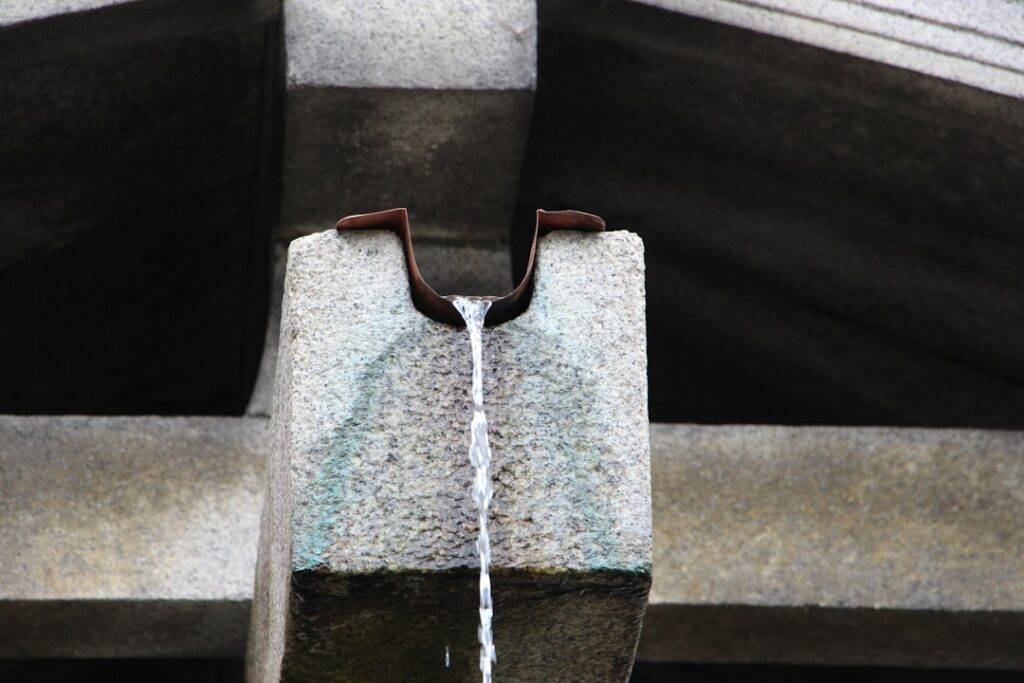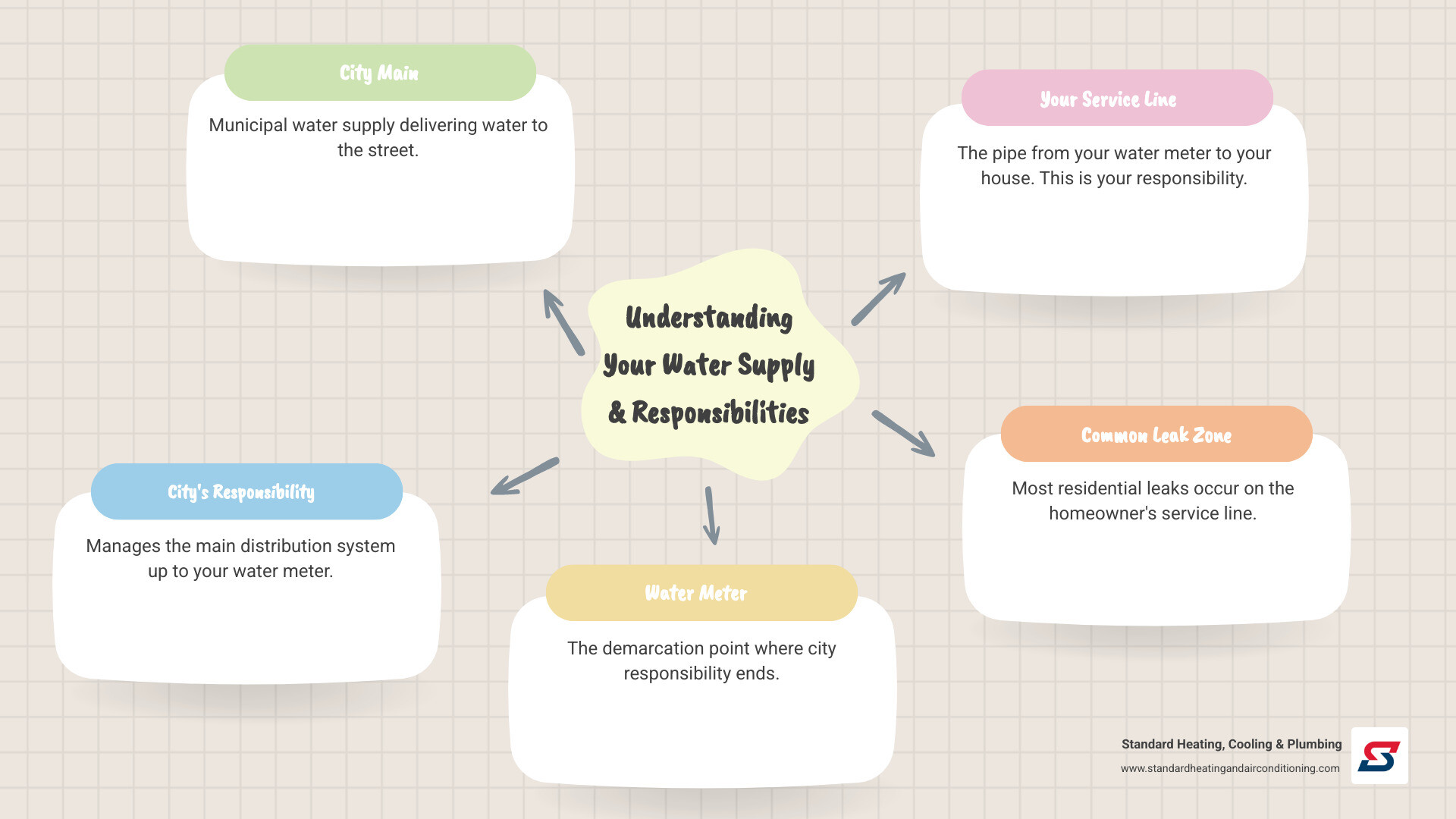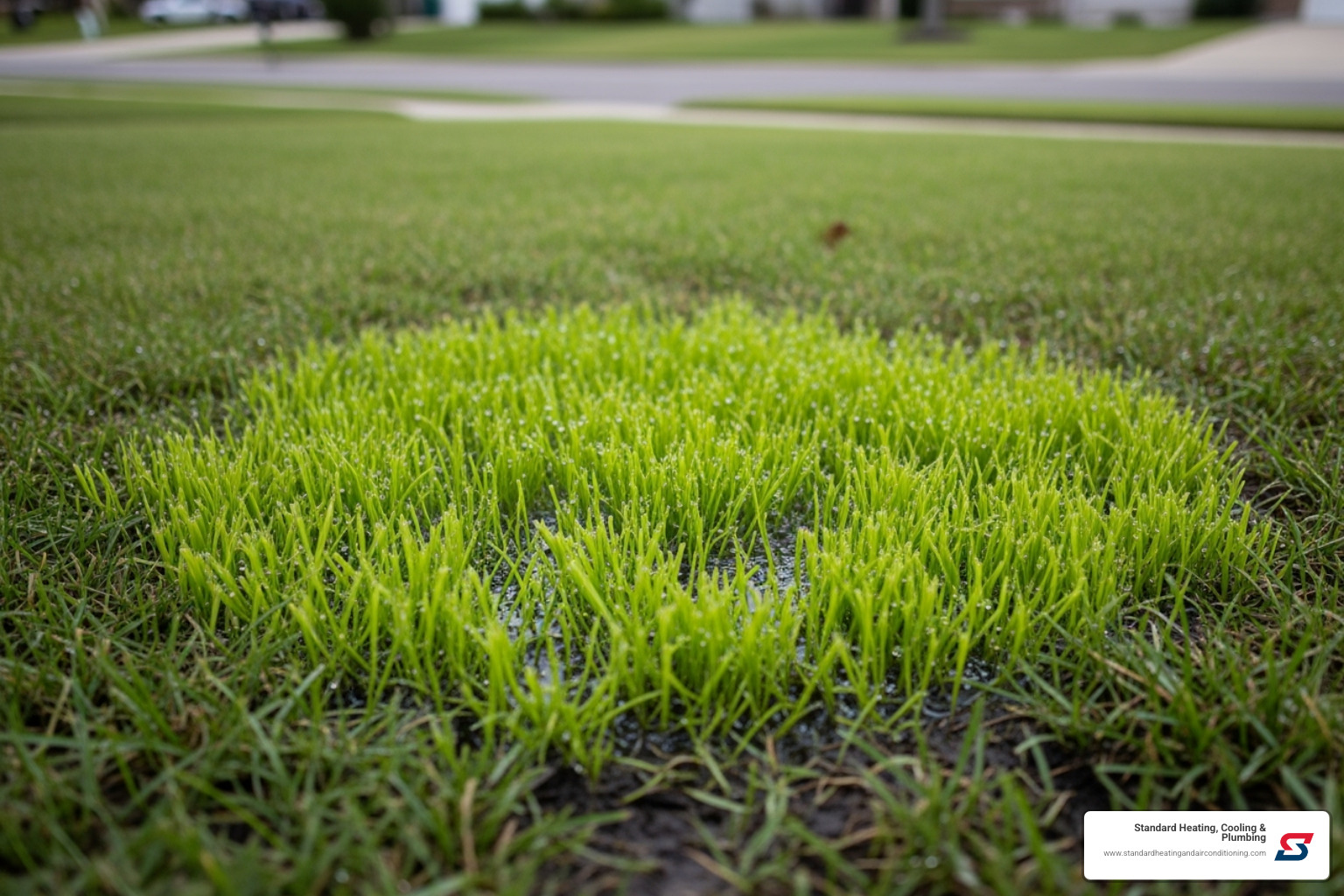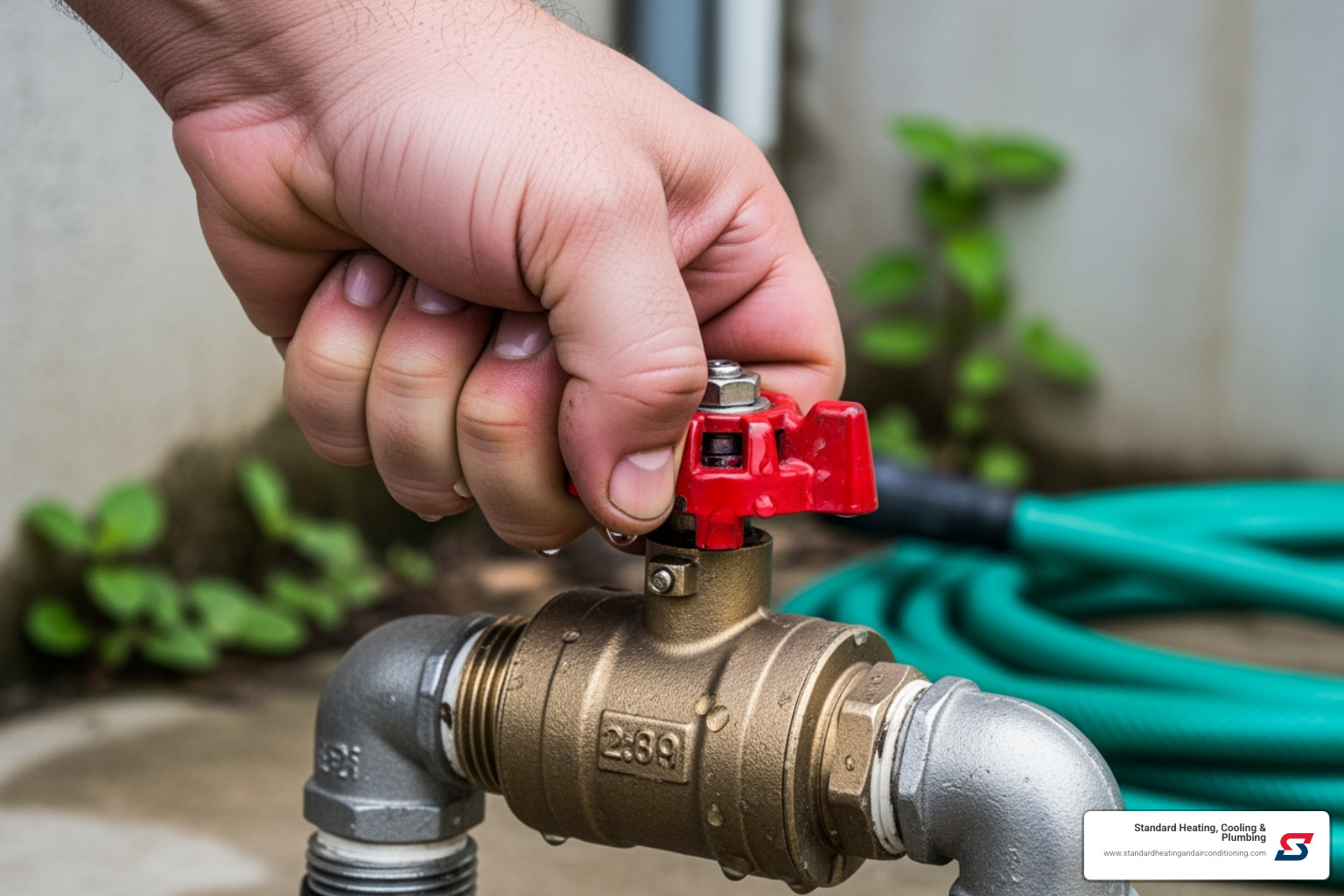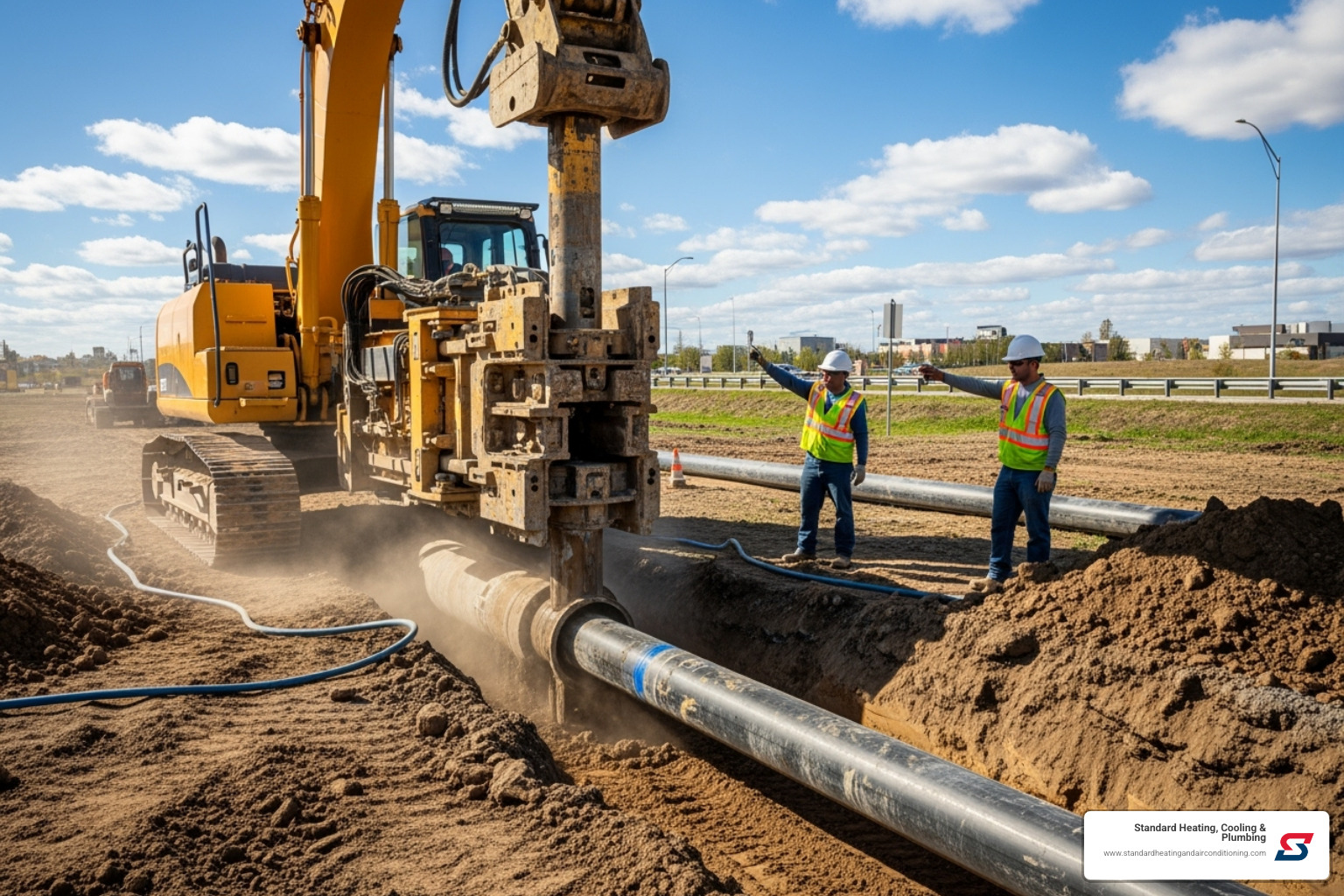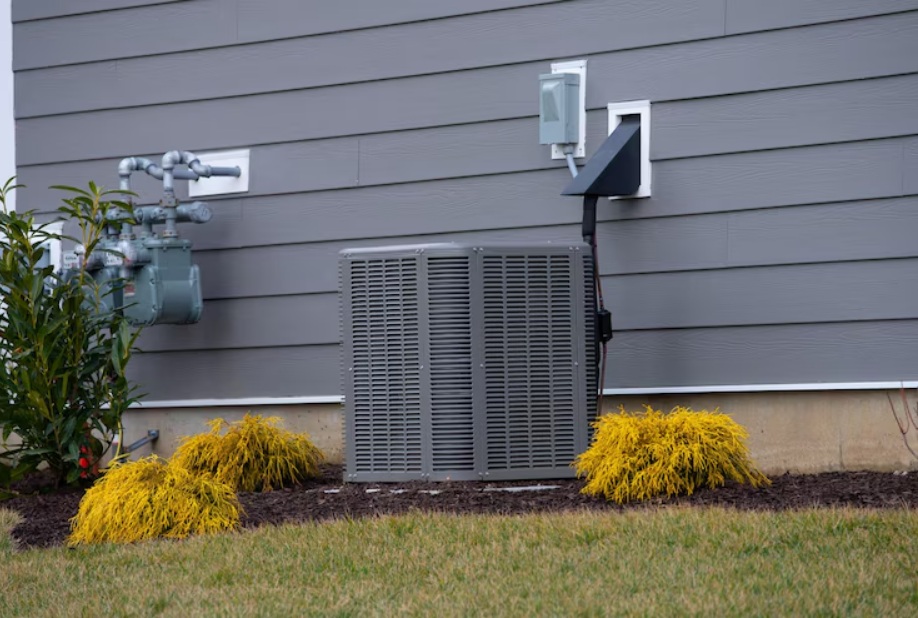Why Addressing a Main Water Pipe Leak Quickly Matters
When you find a main water pipe leak, time is of the essence. A tiny 1/16″ hole can waste over 3,500 liters of water in 24 hours, costing nearly $17 per day. The consequences extend far beyond a high water bill, as water damage can compromise your foundation, create dangerous mold conditions, and turn a small problem into a major disaster.
Quick action steps for a main water pipe leak:
- Shut off your main water supply immediately.
- Contact your water utility to report the issue.
- Call a licensed plumber for professional repair.
- Document damage with photos for insurance.
- Check if the leak is your responsibility (typically from the meter to your house).
Most Birmingham homeowners don’t realize they’re responsible for the water line from their meter to their house. While the city handles the main distribution system, you own the pipe from the meter to your home—and that’s where most residential leaks occur.
This guide walks you through detecting, responding to, and repairing main water pipe leaks. You’ll learn the warning signs, understand your responsibilities, and know when to call a professional.
Spotting the Signs: How to Detect a Main Water Line Leak
A main water pipe leak often starts silently, causing damage long before it becomes obvious. While a geyser in your front yard is a clear sign of trouble, quiet underground leaks can slowly drain your wallet and compromise your home. After 85 years of helping Birmingham families, we know the subtle signs to watch for.
- Sudden High Water Bills: A spike in your water bill without a change in usage is the most common red flag.
- Drop in Water Pressure: If all the faucets in your home suddenly have weak flow, the problem is likely in the main line.
- Unusual Sounds: Hissing, bubbling, or running water sounds when all fixtures are off indicate a hidden leak.
- Wet Spots in the Yard: Soggy patches, sinkholes, or unusually green grass can be caused by an underground leak.
- Foundation Damage: Cracks in your foundation or walls may result from soil erosion caused by a persistent leak.
- Discolored or Smelly Water: Dirt and debris entering a cracked pipe can cause discoloration, while musty odors signal hidden moisture and mold.
For Birmingham homeowners, our guide on Detecting Water Line Issues in Birmingham offers more local specifics.
How to Check Your Water Meter for a Leak
Your water meter can confirm a leak. Here’s a simple test:
- Find your water meter, usually in a box near the street.
- Turn off all water in your home (faucets, toilets, appliances).
- Check the leak indicator on the meter. Most have a small triangle or star that spins when water is flowing. If it’s moving, you have a leak.
- For a more thorough check, write down the meter reading, wait 30-60 minutes without using water, and check again. If the numbers have changed, a leak is confirmed.
Common Causes of a Main Water Pipe Leak
Water lines fail for several reasons, especially in older Birmingham neighborhoods like Homewood and Vestavia Hills.
- Age: Pipes from the 1960s and 70s are reaching the end of their lifespan.
- Corrosion: Galvanized steel pipes are prone to rust and mineral buildup that weakens the pipe walls.
- Ground Shifting: Soil movement from moisture and temperature changes puts stress on rigid pipes.
- Tree Roots: Roots are drawn to moisture and can crack or crush pipes.
- High Water Pressure: Excessive pressure wears out pipes and fittings prematurely.
- Accidental Damage: Digging for landscaping or construction can easily strike a buried water line.
- Poor Installation: Subpar workmanship from decades ago can lead to eventual failure.
Emergency Protocol: What to Do Immediately
When you find a main water pipe leak, acting quickly can minimize damage. Here’s what to do.
- Ensure Safety: Keep everyone away from standing water, especially near electrical outlets.
- Shut Off the Main Water Supply: This is the most critical step. Locate your main shut-off valve (often in a basement, utility closet, or near the water meter) and turn it clockwise (“righty-tighty”) until it stops. If you can’t find it or it’s stuck, call your water utility for help.
- Document the Damage: Take photos and videos of the leak and any affected areas for your insurance claim.
- Assess the Damage: Look for soggy carpets, warped floors, and water stains to understand the scope of the problem.
Homeowner vs. Municipality: Who is Responsible for the Repair?
The location of the main water pipe leak determines who pays for the fix. The municipality is generally responsible for the main line under the street up to your water meter or property line. You are responsible for the pipe from the meter to your house.
If you see water bubbling up from the street, it’s likely the city’s responsibility (contact the Birmingham Water Works Board). If the leak is on your property, it’s time to call a plumber. When in doubt, your local water utility can help determine responsibility.
The Hidden Dangers of a Water Line Leak
A leak is more than a plumbing problem; it’s a threat to your home and health.
- Structural Damage: Saturated ground can rot wood supports and corrode metal components of your home’s structure.
- Foundation Erosion: Water can wash away soil supporting your foundation, leading to settling, cracks, and expensive repairs.
- Mold and Mildew: Mold can grow within 48-72 hours in damp conditions, triggering allergies and respiratory issues.
- Health Hazards: Besides mold, standing water can attract pests, and contaminants can enter your drinking water through the crack.
- Wasted Water Costs: A tiny 1/16″ hole can waste over 3,500 liters of water daily, costing nearly $17 per day. Statistics on water waste from small leaks show how these costs can spiral into thousands of dollars per year.
The Repair Process for a Main Water Pipe Leak
Repairing a main water pipe leak requires professional expertise and specialized equipment. This is not a DIY job.
The Role of a Licensed Plumber
A licensed plumber uses advanced technology to diagnose the problem accurately with minimal disruption.
- Acoustic Listening Devices: These tools detect the sound of water escaping underground, pinpointing the leak’s location.
- Video Camera Inspection: A small camera is fed through the pipe to provide a clear view of internal damage like cracks or blockages.
- Thermal Imaging: These cameras can spot temperature differences in the ground caused by leaking water.
This precision prevents unnecessary digging and saves you money. Learn more in our guide to professional water line repairs.
Understanding Repair Options and Pipe Materials
The type of pipe under your property dictates the best repair strategy. Here are common materials and their traits:
- Copper: Durable and long-lasting (50-70 years), but can develop pinhole leaks.
- PEX (Cross-linked Polyethylene): Flexible, freeze-resistant, and corrosion-proof with a lifespan of 40-50 years.
- PVC (Polyvinyl Chloride): A budget-friendly, corrosion-resistant option that can become brittle over time (25-40 year lifespan).
- Galvanized Steel: Common in older homes, this strong material is prone to internal corrosion that restricts water flow (20-50 year lifespan).
- Lead: Found in very old homes, these pipes pose a serious health risk and must be replaced.
Older homes in areas like Mountain Brook and Vestavia Hills often have aging pipes that present unique challenges. Read about Water Line Vulnerabilities in Older Homes.
Common Repair Methods: From Temporary Fixes to Full Replacement
Depending on the leak, pipe condition, and location, your plumber may recommend one of several methods.
- Spot Repair: A pipe clamp can provide a temporary fix for a small, accessible leak.
- Excavation: The traditional method involves digging a trench to cut out and replace the damaged pipe section. This provides a durable, long-term repair.
- Trenchless Pipe Bursting: A new pipe is pulled through the old, fracturing the damaged line outward while simultaneously replacing it. This method saves your landscaping.
- Trenchless Pipe Lining (CIPP): An epoxy-coated liner is inserted into the old pipe, creating a new, seamless pipe within the old one.
When to repair versus replace? A small, isolated leak in a newer pipe is a good candidate for repair. However, if your pipes are old, have multiple leaks, or are made of hazardous material like lead, full replacement is the more cost-effective long-term solution.
Financial & Preventative Measures
Understanding the costs of a main water pipe leak and how to prevent future issues can save you significant stress and money.
The cost of repair depends on the leak’s location, the repair method used, your pipe material, and labor. A shallow, accessible leak is far less expensive to fix than one under a concrete driveway. While trenchless methods may have a higher upfront cost, they save money on landscape restoration.
Standard homeowner’s insurance policies often do not cover the cost of repairing the pipe itself, especially from wear and tear, but may cover resulting water damage. Review your policy and consider a water line protection plan, which many utility companies offer for a monthly fee.
Repairs also require permits and inspections to ensure they meet local codes in areas from Hoover to Trussville. A professional plumber will handle this process to avoid fines and ensure the work is done correctly.
How to Prevent Future Main Water Pipe Leaks
Proactive maintenance is the best way to avoid a leak.
- Regular Inspections: Have a plumber inspect your system annually to catch corrosion or stress points early.
- Install a Pressure Regulator: High water pressure strains pipes. A regulator maintains a safe, consistent pressure, extending your plumbing’s lifespan.
- Landscape Carefully: Avoid planting trees with aggressive root systems near your water line. Roots are a leading cause of pipe damage.
- Call 811 Before You Dig: This free service marks underground utility lines, preventing costly accidents.
- Know Your Pipes: If you live in an older home, know your pipe’s age and material to plan for proactive replacement before an emergency occurs.
Frequently Asked Questions about Main Water Line Leaks
Over our 85 years serving Birmingham, we’ve heard every question about water line problems. Here are the most common ones.
What is the typical cost to repair a main water line leak?
The cost varies widely. Key factors include the leak’s location and accessibility, the chosen repair method (e.g., excavation vs. trenchless), pipe material, and the amount of labor required. A simple spot repair will cost significantly less than a full line replacement under a driveway. The only way to know for sure is to get a written estimate from a licensed professional.
Can I repair a main water line leak myself?
No, this is a job for a professional. The risks of DIY repair are significant:
- Personal injury from high-pressure water lines.
- Causing more extensive damage to your property.
- Contaminating your home’s water supply.
- Violating local codes, which require permits and licensed work.
A professional has the specialized tools, training, and insurance to do the job safely and correctly.
How long does a main water line repair take?
The timeline depends on the complexity of the job. A simple spot repair in an accessible location might only take a few hours. A full line replacement using traditional excavation typically takes one to two days. Trenchless methods can have a similar project time but have the major advantage of preserving your yard and driveway. We always provide a clear timeline and keep you informed throughout the process.
Protect Your Home with Professional Water Line Repair
A main water pipe leak is more than a plumbing issue; it’s a threat to your home’s structure, your family’s health, and your finances. Early detection saves thousands in wasted water and damage repair. That tiny 1/16″ hole can cost you over $2,000 in just four months from water waste alone, not counting property damage.
There is no substitute for professional expertise when dealing with pressurized underground pipes. A licensed plumber ensures the repair is done safely, meets local codes, and is built to last. Trying to DIY a main line repair often leads to a bigger, more expensive problem.
For 85 years, Standard Heating, Cooling & Plumbing has provided reliable plumbing solutions to families throughout the Birmingham area. Our family-owned business has built its reputation on clear communication, fair pricing, and getting your water flowing safely again as quickly as possible.
We serve communities across the region, including Alabaster, Chelsea, Homewood, Hoover, Mountain Brook, Pelham, Trussville, and Vestavia Hills, bringing the same level of care to every job.
Don’t wait for a small leak to become a disaster. If you notice high water bills, soggy spots in your yard, or other warning signs, it’s time to call the professionals.
Schedule your Birmingham, AL water line repair today and let our experienced team protect your home and peace of mind.

